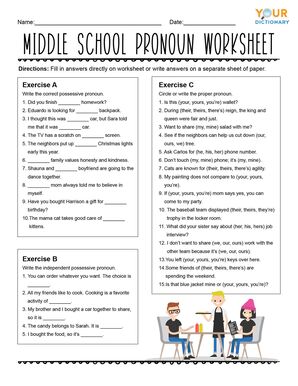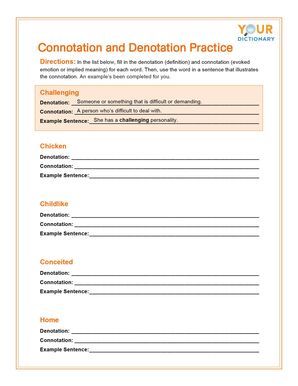

Sixth grade grammar is tricky if you're not careful. Roots, prefixes and suffixes join forces with pronouns to pepper sixth-grader prose. Working to further expand literary and writing muscles, 6th grade grammar starts to look at mood and tone in writing along with figurative language.
6th Grade Writing Conventions
For 6th graders, standard English conventions in Common Core emphasize pronoun usage and punctuation.
Learning Pronouns, Antecedents & Pronoun Types
Sixth graders start to dive into pronouns, antecedents and pronoun types. Core pronoun skills include:
- learning to identify pronouns and the proper antecedent
- choosing between pronoun types
- covering what intensive pronouns are and how they are used in a sentence
- recognizing vague pronouns and inappropriate pronoun shifts

Correcting Verb Forms and Verb Tense
Building off the skills they learned in 5th grade, 6th graders dive deeper into recognizing and correcting verb tense problems. This includes:
- identifying different types of verbs used in sentences and correcting errors
- using progressive and perfect verb tense forms

Past simple vs past continuous worksheet
Click to View & DownloadUsing Proper Punctuation: Dashes & Commas
Punctuation is part of proper writing and 6th graders are beginning to delve into the wonderful world of essays. Therefore, they are learning fun punctuation usage like:
- introducing and using dashes in writing
- using commas with nonrestrictive elements
- compound sentence comma usage
Building Language Knowledge
It’s essential to build up writing skills in 6th grade. Therefore, students work off the skills they learned in 5th grade about similes and metaphors to understand more advanced concepts. Sixth graders are:
- reviewing figurative language
- defining and using figures of speech like personification
- examining mood and tone in writing
A figurative language worksheet is helpful in exploring and discovering more about types of figurative language.
Other Important 6th Grade Vocabulary Skills
Students are steadily learning more about the conventions of English and how best to improve their writing through spelling, grammar and punctuation. However, they build other skills as well.
Using Text to Provide Context Clues
While they touched on it in 5th grade, 6th graders get a steady understanding of finding the context of spelling words or words in works by looking at the information surrounding the word. Students start to examine and decipher examples of context clues. They can use context clue activities to help them build this muscle.
Using Word Roots and Affixes to Decipher Meaning
To help them with context clues, 6th graders explore grade-appropriate Greek and Latin root words to gain clues to word meanings. Affixes and the different types come to the center stage. Try practice worksheets to improve the learning of roots, base words, prefixes, and suffixes for your 6th graders.
Exploring Word Relationships
Sixth graders also strengthen their understanding of word opposites like “whole and part.” They explore examples of antonyms to solidify this concept in their minds. You can also review this relationship in conjunction with synonym and homonym examples.
Using Reference Materials for Context Clues
Another tactic employed by 6th graders for context clues and word meanings is using reference materials like dictionaries to look up roots and determine word meanings. Dictionaries are also used to verify thinking after a determination is made for word meanings.
Learning Connotation and Denotation
Grasping the importance of word relationships also plays into the difference between connotation and denotation. By the end of 6th grade students understand:

Connotation and denotation worksheet
Click to View & DownloadAchieving 6th Grade Grammar Standards
The sixth grade is filled with challenging things to remember. It's easy to get caught up in minutia and drill-and-kill learning, but remember that your young grammarian is not a robot. If you can get a 6th grader to learn a few of the aforementioned points without abominating the language, you've done at least a million times better than Teddy Ruxpin ever could. Further your grammar knowledge by checking out the needs for 7th grade grammar.